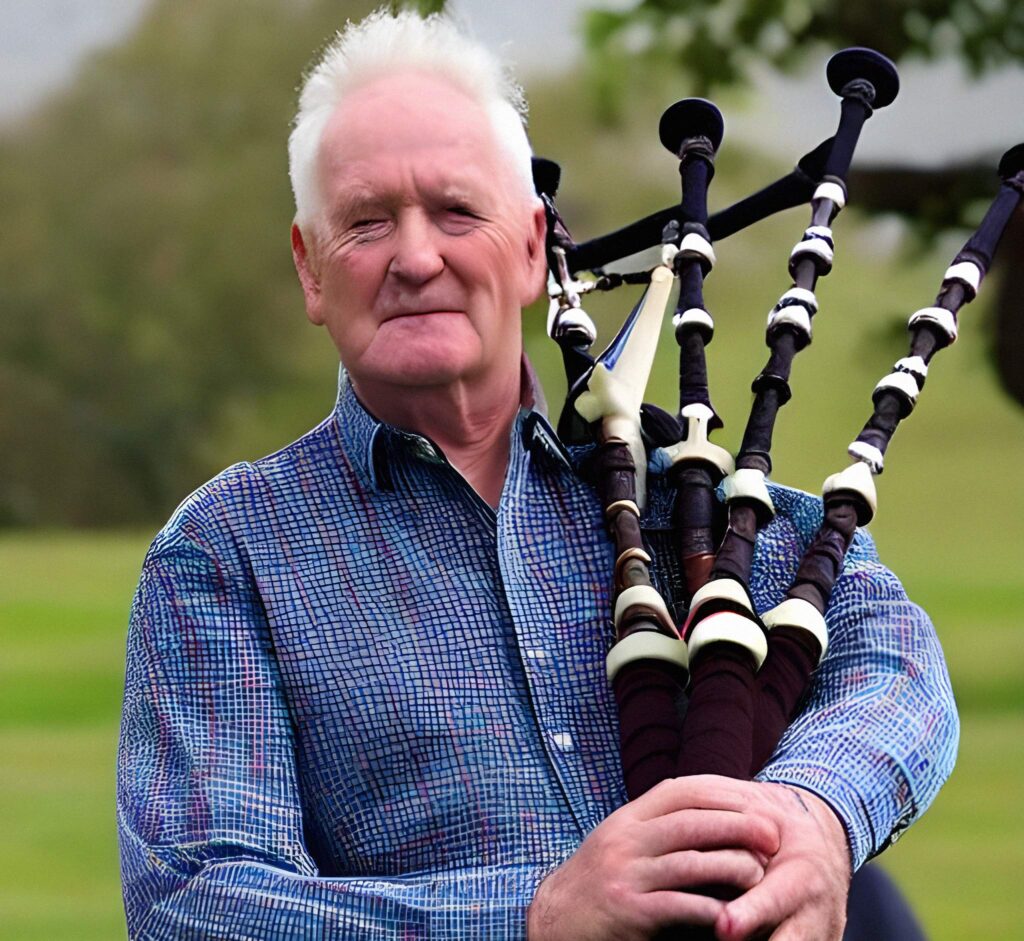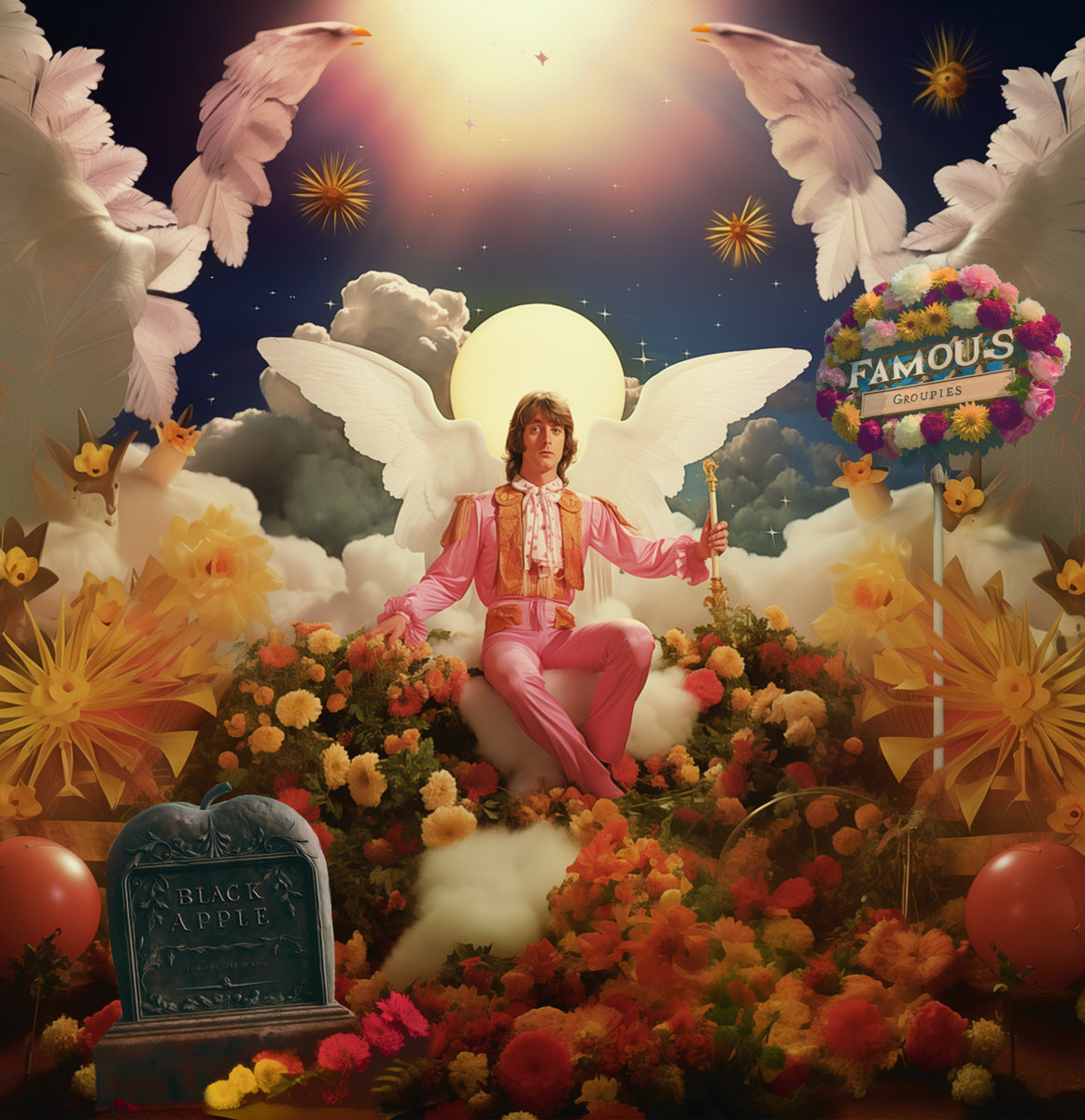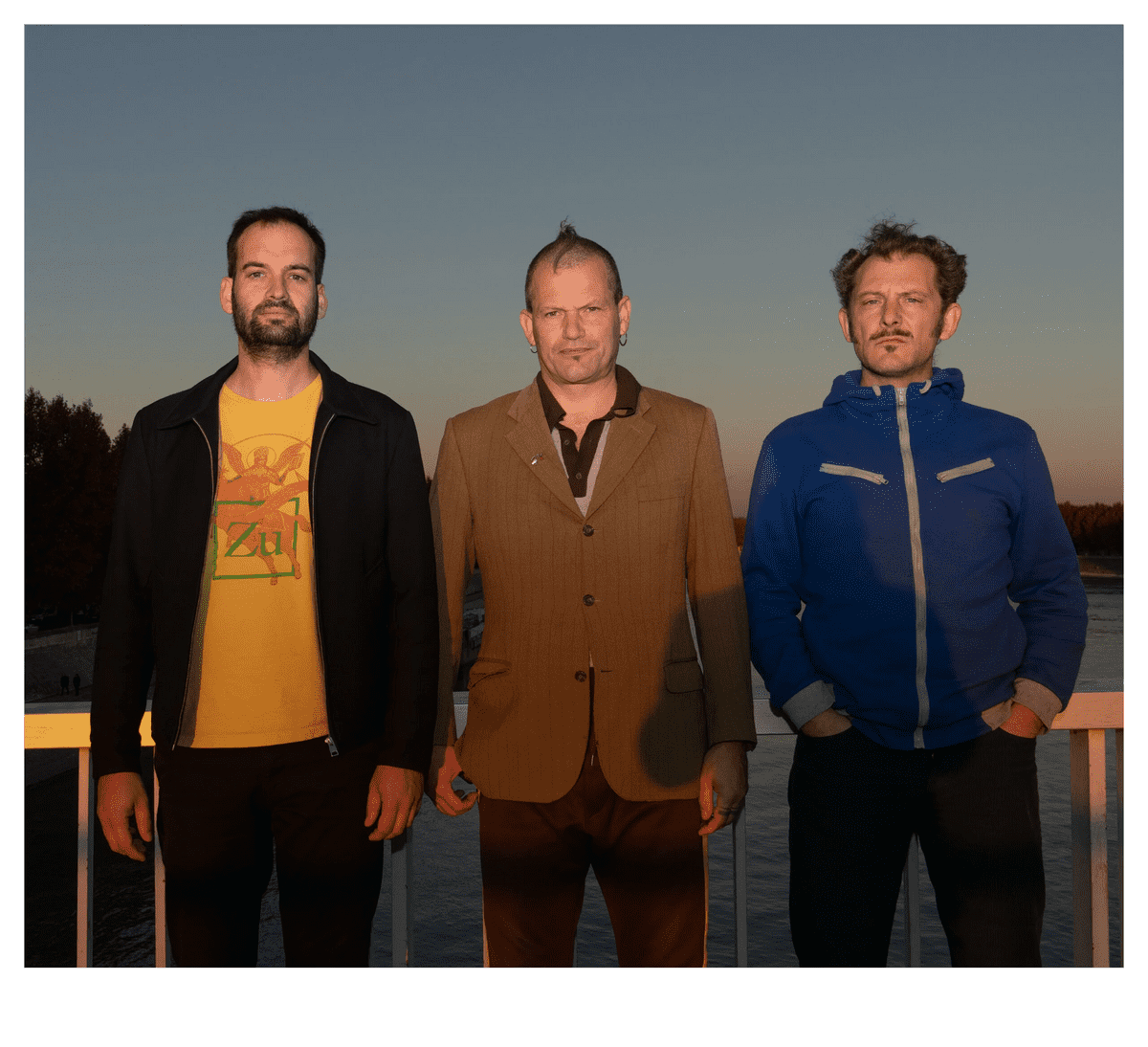Black Apple: Famous Groupies from this End of the Telescope | An interview with Kirkcaldy McKenzie
“It seems that Patrick started off quite quickly as a ghost writer for Decca, circa 1965 or thereabouts. And of course, ghost writers are hidden in the backdrop for obvious reasons,” says Famous Groupies’ band leader Kirkcaldy McKenzie in an email.
The band is named after a (Paul McCartney and) Wings song, consisting of six McKenzies and a friend or two paying tribute to their late relative and friend Patrick McKenzie (grandfather to Kirkcaldy), who wrote the originals of all their songs. Their image and effect is (both intentionally and accidentally) intertwined with the Paul is Dead mythos. As a lover of anomalies, I probably wouldn’t have gotten onto them without that connection.
“To say that Patrick’s uncanny ability to write a song that sounded like early McCartney and Wings was unusual—well, that would be an understatement. So the obvious and immediate connection to the PID community makes sense. But the facts are equally as elusive as the Paul is Dead legend itself. It’s enough to drive anyone insane after too long, so I don’t dwell on it too much anymore. I can confirm that Patrick was introduced to Paul in 1966, by none other than Denny Laine*. Patrick had met Denny at Decca. So they did know each other to a certain degree. Beyond that I am unclear.”

The Scottish pop group’s most recent collection, a 2-CD set released in 2024 called Black Apple, opens with a song called “Apple Obscura,” directly referencing the Beatles’ Abbey Road via some very similar guitar work and immediately guaranteeing listenership from legions of Beatles fans, in particular those who give any credence to the Paul is Dead myth—a thought experiment which seems endlessly productive of more clues and evidence both for and against its likelihood, and keeps itself alive forever that way. This first song’s powerful hypnosis is followed by the animated “Feets of Fire” and “Talk it Over,” which has a similar effect to Beatles songs like “We Can Work it Out” (written as a message from Paul to John), then by “One Heartbeat Away,” an expression of joyful exuberance, and “Scotch of St. James,” a heartfelt song about being young in London in the sixties: Do you remember? Do you recall? We did it all.
Kirkcaldy’s voice sounds exactly like McCartney’s, and listeners will ask themselves, “Is that all it is?” “Did his grandfather leave notes instructing him to sing a certain way?” before realizing that vocal style is the perfect complement for these melodies regardless of the answers to your questions, and one of the musical geniuses involved has figured that out to the degree it doesn’t matter. The late Patrick McKenzie may have written these songs, but grandson Kirkcaldy’s studio genius and musicianship has modernized and made them timeless. This is more than imitation.
McCartney’s retreat to his newly purchased Scottish farm (see the Beatles’ “Fixing a Hole” and Wings’ “Mull of Kintyre”) in 1968 was uncharacteristic behavior for him at the time, and is widely cited as an inspiration for unconfirmed rumors he was dead. I asked Kirkcaldy whether, as a Scotsman, he believed McCartney’s alleged replacement Billy Shears (aka William Shepherd) is or was the self-proclaimed Great Beat 666 Aleister Crowley’s Scottish son, as suggested by the latest edition of The Memoirs of Billy Shears by Thomas Uharriet. “I have read Memoirs, and as compelling of a read as it is, I can’t quite wrap my head around that possibility. I suppose it is possible, but I doubt it.”
Then I asked him if he thinks Paul McCartney was replaced by Billy Shears in 1966. “It’s certainly possible, and Patrick is clearly talking about this at great length in that song [‘Don’t Bury Me’ (from Rehearsing the Multiverse, 2020)], which seems to lend legitimacy to the idea.”
“Ghost writer” from a previous Groupies offering, The Furry White Album, is Patrick’s anthem, embodying just as much or more excitement than provided by a rock star’s life, despite his anonymous state by comparison. “He lived a modest life, but he did travel a lot. He had a fair sized house with a basement studio, one car, and not many expensive items about the place. And loads of instruments, everywhere. He has a Trust, which is run by my father and a few business gents whom I do not know. Dad keeps much of that business discreet or secret.”
Readers outside the UK may never have heard of some of the bands he wrote for—people like Tony Sheridan, Gerry Marsden of Gerry and The Pacemakers, The Boston Dexters, The Honeywells, Debbie Green and others. “Patrick left behind hundreds of reel-to-reel tapes, cassettes, vinyl… etc. All of which has to be researched to a certain degree so as to know who is who. Many of the tapes do not have notes written on the back of the boxes, and those that do are old and faded and sometimes illegible.”
Famous Groupies’ lyrics are alternately worldly and humorous and sarcastically sweet, with the same bouncy, surprising melodic shifts and states of hypnotic rumination as Beatles classics, with a resonance from before we were born. The likeness to Paul McCartney’s essential form—now revealed as a proven mechanism to be renovated and its effects on the human nervous system replicated—is eerily pervasive. Around the middle of this 2-CD collection, “Three Whale Rock” recalls the orchestral childishness of power-pop bands like Jethro Tull and 70s-era Yes, as if done by McCartney with a secret side-project (when, in fact, it’s something exactly along those lines created by a pop ghost writer who’s a McCartney aficionado at the other end of the telescope). “Seven Rooms” (at the beginning of Disc 2) is a multi-part suite romanticizing the Golden Age of Hollywood, bringing thoughts of the Beatles’ song “I Will,” (supposed—by him—to be a letter to Charles Manson), and The Kinks’ concept albums (Ray made a series of those), all as if done by Paul McCartney. One section is titled “Roman Throws a Party” (Room 3), a reference to the infamous misfortunes at the Polanski residence (iykyk) in August 1969 while the householder was away in Europe working on another film about the devil or vampires and whatever else he was getting up to over there. We’ve all heard stories.
Famous Groupies has recorded five albums so far, also including The Chameleon Sessions, Rehearsing the Multiverse, and Double Entendre. Black Apple has the feel of a comprehensive final statement, but the liner notes reference an endless trove of material to draw from. What’s next for Famous Groupies? “Well, it is a final statement in that Famous Groupies will not record anything further—together. But that’s not to say that I can’t record a few things in the future. There are at least an album’s worth of songs that were not used for a few of the records, especially Black Apple. Some songs are completed and some are not. So, a Rarities album might happen at some point in the future.”
There are so many highly listenable songs on Black Apple I won’t bother hyping each one. Instead I’ll say it’s as though the late-period Beatles had released a new world-changing, history-making double album heavy on the McCartney essence, only times have changed and almost no one outside of Japan even noticed, and it isn’t the Beatles (despite multiple indications otherwise), but someone just as great you never knew about until now, and fun-loving listeners will be left confused, inspired, happy, and satisfied.
Don’t despair, Paul is Dead-ists: Famous Groupies’ bassist, Faul** McKenzie, is never pictured, begging the question—is it Paul McCartney in disguise? If he’s got that farm in Scotland . . . Says Kirkcaldy, “That’s a bit of an inside joke. But really, you wouldn’t believe me if I told you.”
By the liner notes, Ailsa Inness “perfectly captured a young Patrick on the cover of Black Apple.”
Famous Groupies’ albums are available at this site, which includes a journal and other features: https://www.famousgroupies.rocks and this one:
https://satellitesgroup.bandcamp.com/album/famous-groupies-black-apple
The late Denny Laine (1944–2023) played guitar, bass, and keyboards (also backing and occasional lead vocals) in Wings, played guitar and sang in the Moody Blues before that, has been accused of being a double for Paul McCartney during the Beatles years, was ostensibly implicated in a recent exposure of Billy Shears (both unconfirmed), and here’s to him. Pour something out for the homie.
Contraction of “False Paul” popularized by PID enthusiasts.
Zack Kopp




